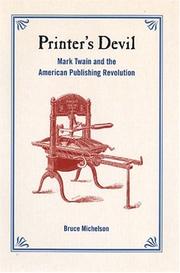| Listing 1 - 5 of 5 |
Sort by
|

ISBN: 9786611959340 1281959340 0226100294 9780226100296 9781281959348 0226100324 9780226100326 0226100324 0226100332 9780226100326 9780226100333 6611959343 Year: 2006 Publisher: Chicago : University of Chicago Press,
Abstract | Keywords | Export | Availability | Bookmark
 Loading...
Loading...Choose an application
- Reference Manager
- EndNote
- RefWorks (Direct export to RefWorks)
People-especially Americans-are by and large optimists. They're much better at imagining best-case scenarios (I could win the lottery!) than worst-case scenarios (A hurricane could destroy my neighborhood!). This is true not just of their approach to imagining the future, but of their memories as well: people are better able to describe the best moments of their lives than they are the worst. Though there are psychological reasons for this phenomenon, Karen A.Cerulo, in Never Saw It Coming, considers instead the role of society in fostering this attitude. What kinds of communities develop this pattern of thought, which do not, and what does that say about human ability to evaluate possible outcomes of decisions and events? Cerulo takes readers to diverse realms of experience, including intimate family relationships, key transitions in our lives, the places we work and play, and the boardrooms of organizations and bureaucracies. Using interviews, surveys, artistic and fictional accounts, media reports, historical data, and official records, she illuminates one of the most common, yet least studied, of human traits-a blatant disregard for worst-case scenarios. Never Saw It Coming, therefore, will be crucial to anyone who wants to understand human attempts to picture or plan the future. "In Never Saw It Coming, Karen Cerulo argues that in American society there is a 'positive symmetry,' a tendency to focus on and exaggerate the best, the winner, the most optimistic outcome and outlook. Thus, the conceptions of the worst are underdeveloped and elided. Naturally, as she masterfully outlines, there are dramatic consequences to this characterological inability to imagine and prepare for the worst, as the failure to heed memos leading up to both the 9/11 and NASA Challenger disasters, for instance, so painfully reminded us."--Robin Wagner-Pacifici, Swarthmore College "Katrina, 9/11, and the War in Iraq-all demonstrate the costliness of failing to anticipate worst-case scenarios. Never Saw It Coming explains why it is so hard to do so: adaptive behavior hard-wired into human cognition is complemented and reinforced by cultural practices, which are in turn institutionalized in the rules and structures of formal organizations. But Karen Cerulo doesn't just diagnose the problem; she uses case studies of settings in which people effectively anticipate and deal with potential disaster to describe structural solutions to the chronic dilemmas she describes so well. Never Saw It Coming is a powerful contribution to the emerging fields of cognitive and moral sociology."--Paul DiMaggio, Princeton University
Catastrophical, The. --- Cognition and culture. --- Social psychology. --- Knowledge, Sociology of. --- optimism, pessimism, worst-case scenarios, imagination, future, psychology, community, decision making, consequences, outcomes, results, prediction, forecasting, positive symmetry, disaster preparedness, preparation, warnings, iraq, war on terror, terrorism, katrina, 9/11, nasa, challenger explosion, moral sociology, cognition, nonfiction, history, politics.
Book
ISBN: 1451864396 1462381081 1451988087 9786613822871 1452729964 1282636693 Year: 2006 Publisher: [Washington, D.C.] : International Monetary Fund,
Abstract | Keywords | Export | Availability | Bookmark
 Loading...
Loading...Choose an application
- Reference Manager
- EndNote
- RefWorks (Direct export to RefWorks)
Knightian uncertainty (ambiguity) implies presence of uninsurable risks. Institutional quality may be a good indicator of Knightian uncertainty. This paper correlates non-life insurance penetration in 70 countries with income level, financial sector depth, country risk, a measure of cost of insurance, and the World Bank governance indexes. We find that institutional quality-transparency-uncertainty nexus is the dominant determinant of insurability across countries, surpassing the explanatory power of income level. Institutional quality, as it reflects on the level of uncertainty, is the deeper determinant of insurability. Insurability is lower when governance is weaker.
Electronic books. -- local. --- Risk (Insurance). --- Risk management -- Econometric models. --- Finance --- Business & Economics --- Insurance --- Risk (Insurance) --- Risk management --- Econometric models. --- Risk --- Management --- Macroeconomics --- Industries: Financial Services --- Intelligence (AI) & Semantics --- Insurance Companies --- Actuarial Studies --- Formal and Informal Sectors --- Shadow Economy --- Institutional Arrangements --- Personal Income, Wealth, and Their Distributions --- Pension Funds --- Non-bank Financial Institutions --- Financial Instruments --- Institutional Investors --- Technological Change: Choices and Consequences --- Diffusion Processes --- Insurance & actuarial studies --- Artificial intelligence --- Personal income --- Insurance companies --- Income
Book
ISBN: 1462370985 1452751145 128351835X 1451909438 9786613830807 Year: 2006 Publisher: Washington, D.C. : International Monetary Fund,
Abstract | Keywords | Export | Availability | Bookmark
 Loading...
Loading...Choose an application
- Reference Manager
- EndNote
- RefWorks (Direct export to RefWorks)
Total factor productivity (TFP) of 14 manufacturing sectors in France has kept up with that of the United States during 1980-2002 and remained well above that of the United Kingdom. Estimates using a dynamic panel equilibrium correction model indicate that sectors further behind the technological frontier experience faster productivity growth and that spending on research and development and trade with technologically advanced economies positively influences TFP growth, but not the speed of convergence. Conversely, TFP growth is negatively related to some key labor market variables, namely the replacement ratio and the ratio of the minimum wage to the median wage.
Business & Economics --- Economic History --- Labor --- Information Management --- Production and Operations Management --- Innovation --- Research and Development --- Technological Change --- Intellectual Property Rights: General --- Measurement of Economic Growth --- Aggregate Productivity --- Cross-Country Output Convergence --- Comparative Studies of Countries --- Production --- Cost --- Capital and Total Factor Productivity --- Capacity --- Macroeconomics: Production --- Demand and Supply of Labor: General --- Technological Change: Choices and Consequences --- Diffusion Processes --- Macroeconomics --- Labour --- income economics --- Knowledge management --- Total factor productivity --- Productivity --- Labor markets --- Technology transfer --- Capacity utilization --- Technology --- Industrial productivity --- Labor market --- Industrial capacity --- United States
Book
ISBN: 9782757812174 2020904578 9782020904575 2021152286 2021013863 2757812173 Year: 2006 Volume: 409 Publisher: Paris : Editions du Seuil,
Abstract | Keywords | Export | Availability | Bookmark
 Loading...
Loading...Choose an application
- Reference Manager
- EndNote
- RefWorks (Direct export to RefWorks)
Bibliotheek François Vercammen
Decolonization --- Décolonisation --- History --- Histoire --- Décolonisation --- Post-colonial history - Delocolonization - 20th century --- History, Modern --- Nationalism --- Postcolonialism --- 94 --- World history --- Sovereignty --- Autonomy and independence movements --- Colonization --- Post-colonialism --- Postcolonial theory --- Political science --- Consciousness, National --- Identity, National --- National consciousness --- National identity --- International relations --- Patriotism --- Internationalism --- Political messianism --- 94 Middeleeuwen en Nieuwe/Nieuwste Tijd--in het algemeen --- Middeleeuwen en Nieuwe/Nieuwste Tijd--in het algemeen --- Post colonial period --- 20th century --- History & Archaeology --- History - General --- Post-colonial history - Delocolonization - 20th century. --- History, Modern - 20th century --- Decolonization - History - 20th century --- DECOLONISATION --- HISTOIRE --- CAUSES ET CONSEQUENCES

ISBN: 0520932846 9780520932845 0520247590 9780520247598 Year: 2006 Publisher: Berkeley University of California Press
Abstract | Keywords | Export | Availability | Bookmark
 Loading...
Loading...Choose an application
- Reference Manager
- EndNote
- RefWorks (Direct export to RefWorks)
Trained as a printer when still a boy, and thrilled throughout his life by the automation of printing and the headlong expansion of American publishing, Mark Twain wrote about the consequences of this revolution for culture and for personal identity. Printer's Devil is the first book to explore these themes in some of Mark Twain's best-known literary works, and in his most daring speculations-on American society, the modern condition, and the nature of the self. Playfully and anxiously, Mark Twain often thought about typeset words and published images as powerful forces-for political and moral change, personal riches and ruin, and epistemological turmoil. In his later years, Mark Twain wrote about the printing press as a center of metaphysical power, a force that could alter the fabric of reality. Studying these themes in Mark Twain's writings, Bruce Michelson also provides a fascinating overview of technological changes that transformed the American printing and publishing industries during Twain's lifetime, changes that opened new possibilities for content, for speed of production, for the size and diversity of a potential audience, and for international fame. The story of Mark Twain's life and art, amid this media revolution, is a story with powerful implications for our own time, as we ride another wave of radical change: for printed texts, authors, truth, and consciousness.
Printing in literature. --- Printing --- Publishers and publishing --- Authors and publishers --- Book publishing --- Books --- Book industries and trade --- Booksellers and bookselling --- Printing, Practical --- Typography --- Graphic arts --- History --- Publishing --- Twain, Mark, --- Twain, Mark --- Tvėn, Mark --- Tuėĭn, Mark --- Tuwayn, Mārk --- Twayn, Mārk --- Tʻu-wen, Ma-kʻo --- Tven, M. --- Touen, Makū --- Twain, Marek --- Make Tuwen --- Tuwen, Make --- Make Teviin --- Твен, Марк --- Touain, Mark --- טבןַ, מרק, --- טוויין, מארק, --- טוויין, מרק, --- טווין, מארק, --- טווין, מרק, --- טווען, מארק, --- טוין, מרק, --- טװען, מארק, --- טװײן, מארק, --- 馬克吐温, --- Tuvāyn, Mārk --- Tvāyn, Mārk --- تواين، مارک --- Clemens, Samuel Langhorne --- Snodgrass, Quintus Curtius --- Conte, Louis de --- Knowledge --- Printing. --- Book history --- United States --- american publishing history. --- americana. --- consequences of a revolution. --- cultural revolution. --- easy to read. --- editing and publishing. --- engaging. --- epistemological. --- epistemology. --- famous american writers. --- historical. --- history of publishing. --- international fame. --- life changes. --- lifetime. --- lively. --- media revolution. --- metaphysical power. --- printing press. --- publishing and printing industry. --- radical change. --- retrospective. --- typesetting. --- wood cutting. --- United States of America
| Listing 1 - 5 of 5 |
Sort by
|

 Search
Search Feedback
Feedback About
About Help
Help News
News